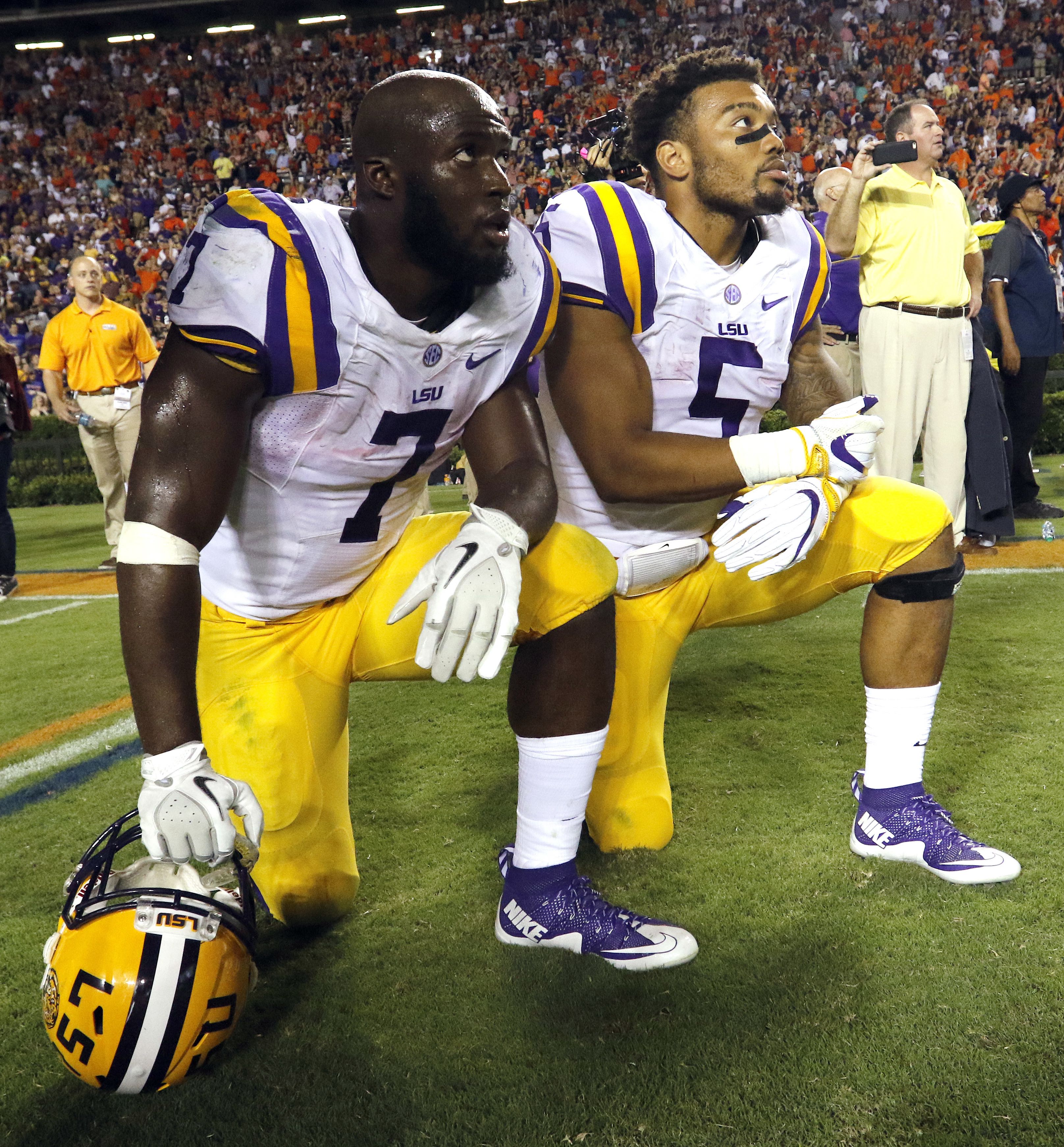Tim Mueller / Special to Bleacher Report
He can't unsee it. The image flashing on the television of a man on the ground with a bloody bag covering his lifeless body.
He can't unhear it. The friends and family at his home days later, speaking in hushed tones about the headstrong father who never backed down, and about how it took two days to get all his blood out of the carpet of the Denny's.
He can't forget it.
Derrius Guice was only six years old when his father was murdered, when he saw the scene on the news, when he heard his family debating the fight that led to the gunshots.
"You see that stuff when you're [that young]…that takes a huge toll on you," Guice says. "That sticks with you forever."
It's enough to wreck a family. But it didn't wreck Guice.
Instead, the trauma became the foundation for his future, for how he would escape a similar destiny and instead become what he is today, a star running back at LSU with a potentially huge NFL future.
"I'm not turning back there," Guice says.
Not turning back there. It's a mantra. It's a way forward. For Guice, it's the only way forward.
Not turning back there to South Baton Rouge, mere miles away from Guice's new safe haven on the stately, oak-shrouded LSU campus.
Not turning back there to the corner of Highland Road and Washington Street, where the washed-up and washed-out stand and talk about how great they once were at football or basketball—how they didn't really want this life of stealing and drugs and guns, but how they sure as hell weren't going to leave their boys behind.
Not turning back there to the days of not knowing where he'd sleep at night or what he'd eat on any given day, if anything.
Not turning back there to the painful days of high school at a local, nearly all-white private school plopped in the middle of South Baton Rouge like a rose amid the thorns—a school that recruited him to play football, then threw him into a mess of racism and stereotypes.
Not turning back there to a reality that still exists, in which Guice's older brother Derrick, named after their murdered father, was arrested just a month ago—two days before LSU's mega-matchup against Alabama—for (among other charges) attempted second-degree murder. Derrick is accused of driving the getaway car after two other men fired 37 shots into a house on Nebraska Street, just two blocks from where the brothers grew up.
Not turning back there to a past Guice is still running from.
"People tell me, 'Man, you run angry,'" Guice says. "If you grew up where I grew up, and you knew this game was the only thing that can get you and your family out, you'd run angry, too. Every damn time you touched the ball."
The results are startling, even compared to projected top-five draft pick Leonard Fournette, the tailback with whom Guice currently shares carries at LSU.
"The way [Guice] runs, my guess is half or more [NFL teams] would take him over Fournette right now."
— AFC scout
Fournette missed four games this fall with a dinged ankle, and in those games, Guice rushed for nearly as many yards (765) as Fournette did all season (843). Guice's 8.6 yards per carry as the starter (and 8.0 overall) are ahead of Fournette's average (6.5), and Guice is leading LSU in yards (1,249) and touchdowns (14) heading into the Citrus Bowl against Louisville on New Year's Eve.
Fournette has announced he will skip the team's Citrus Bowl appearance this week and then forego his final season of eligibility to enter the NFL draft, leaving the job to Guice. If the next year goes as expected, Guice will eventually be in the same position Fournette is in. He says he also plans to skip his senior season in favor of the draft.
NFL teams will be waiting.
At least, that's the way it looks from the outside.
"The way [Guice] runs, my guess is half or more [teams] would take him over Fournette right now," one AFC scout says. "You have to understand, it's not just highlight plays in this league. It's the ability to grind over four quarters, and yeah, it's absolutely the want and desire to run the ball."

Leonard Fournette and Derrius Guice (Butch Dill / AP Photo).
Asked if Fournette has that want and desire, the scout says, "That will be the No. 1 question from every team that interviews him."
Asked if Guice has it, the scout simply says, "The tape is your resume."
Fournette has seen it up close. The want and desire. The running angry.
"Derrius runs like he might never run again," he says.
✦✦✦







